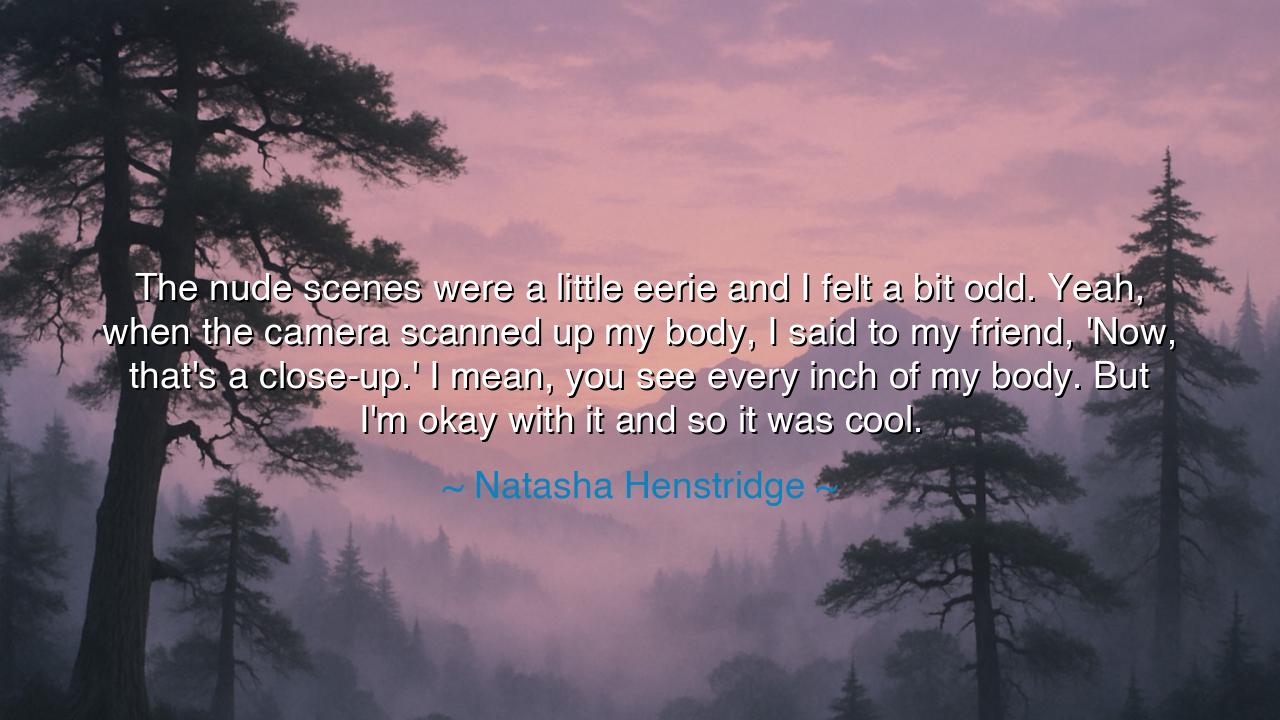
The nude scenes were a little eerie and I felt a bit odd. Yeah
The nude scenes were a little eerie and I felt a bit odd. Yeah, when the camera scanned up my body, I said to my friend, 'Now, that's a close-up.' I mean, you see every inch of my body. But I'm okay with it and so it was cool.






"The nude scenes were a little eerie and I felt a bit odd. Yeah, when the camera scanned up my body, I said to my friend, 'Now, that's a close-up.' I mean, you see every inch of my body. But I'm okay with it and so it was cool." These words spoken by Natasha Henstridge touch on the complex relationship between vulnerability and acceptance. Henstridge, reflecting on the intimate act of being filmed in such a personal and exposed manner, acknowledges the initial awkwardness and discomfort that comes with being in the spotlight. Yet, she ends with an air of acceptance—an understanding that while exposure can feel unnerving, embracing it with confidence and composure allows her to move through the experience without being consumed by it. Her words serve as a reminder that vulnerability, when handled with self-assurance, can become a source of empowerment rather than a burden.
In the ancient world, vulnerability was often seen as both a strength and a test. Greek mythology, for example, is full of heroes and gods who were often at their most powerful in their moments of vulnerability. Consider Achilles, the great warrior of the Iliad, whose near invulnerability in battle did not shield him from the deep sorrow and rage he felt over his personal losses. His Achilles' heel, a physical vulnerability, was also the source of his humanity, reminding us that even the strongest of figures had moments of fragility. This blend of power and weakness is key to understanding Henstridge’s experience—her physical exposure may have been uncomfortable, but it allowed her to transcend it and move into a place of empowerment, much like the ancient heroes who overcame their weaknesses.
The Romans, too, understood that exposure was an important element of both strength and leadership. Julius Caesar, one of the most powerful figures in Roman history, often used his image as a tool to solidify his authority. His public appearances and representations, from coins to statues, showcased his image for all to see. Despite the inherent vulnerability in such displays, Caesar used them to project strength, dominance, and a connection to the people. Similarly, Henstridge’s willingness to expose herself before the camera, though initially uncomfortable, is a kind of empowerment that mirrors the public personas cultivated by historical figures. Both Caesar and Henstridge used exposure to further their goals, demonstrating how self-assurance in vulnerability can turn what is uncomfortable into an opportunity for growth.
The nude scenes Henstridge speaks of also remind us of the tension between body and identity—an issue that has been present throughout history. In the Middle Ages, the body was often seen as a temple that should be kept pure and hidden, especially for women. The act of exposing the body was reserved for specific, often sacred, contexts. Over time, however, as the Renaissance unfolded, attitudes toward the body began to shift, embracing the human form as a thing of beauty and expression. Artists like Michelangelo and Leonardo da Vinci celebrated the human body, depicting it in all its vulnerability and magnificence. This shift reflects the evolving idea that our bodies are not simply vessels of shame or discomfort, but expressions of beauty and individuality. Henstridge’s ability to accept and embrace her exposure in the film industry echoes this Renaissance understanding of the body as a source of empowerment rather than something to be hidden away.
In the modern world, the idea of being exposed—whether physically or emotionally—is often viewed through the lens of self-confidence. The rise of social media and reality television has amplified the visibility of private moments, transforming vulnerability into something that is often shared, rather than hidden. Celebrities like Beyoncé have embraced vulnerability as a means of connecting with their audience, offering glimpses of their true selves. In a similar vein, Henstridge’s words reflect her understanding that exposure, though initially uncomfortable, can become a source of empowerment. It is through this willingness to be seen—in all her humanity—that she is able to find peace and even pride in her role, which she likely could not have achieved had she avoided the discomfort altogether.
The lesson in Henstridge’s words is one of self-acceptance and embracing vulnerability. To be vulnerable—whether through physical exposure, emotional openness, or personal expression—is to invite the world to see us as we truly are. Often, it is in these moments of discomfort that we grow, that we discover our own strength. Henstridge’s experience teaches us that vulnerability, when met with acceptance and composure, can transform into empowerment. The discomfort she initially felt became a stepping stone to self-assurance and confidence, allowing her to take ownership of her body and her choices.
In practical terms, we must learn to embrace vulnerability in our own lives—not as something to be feared, but as an opportunity for growth. Whether it’s in a relationship, a creative pursuit, or a public space, we must recognize that vulnerability does not diminish our worth but enhances it. It is in these exposed moments that we have the power to connect more deeply with ourselves and with others. Just as Henstridge found empowerment through her willingness to be seen, we too can find strength in our willingness to show up authentically, to shed the masks we wear, and to embrace both our strengths and weaknesses.






AAdministratorAdministrator
Welcome, honored guests. Please leave a comment, we will respond soon